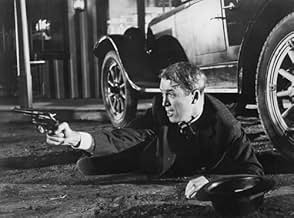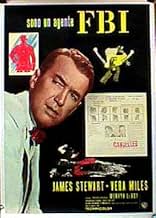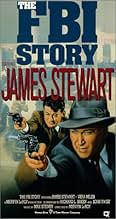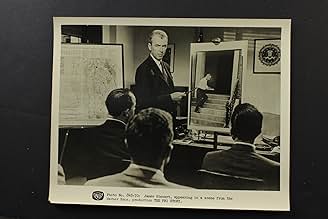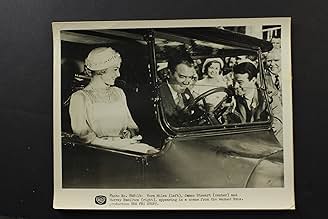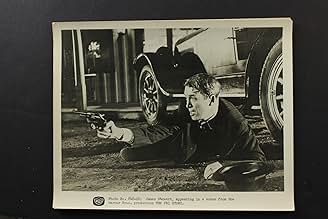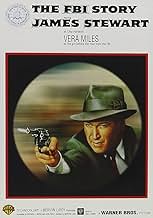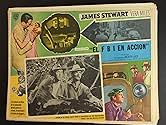IMDb RATING
6.5/10
4.1K
YOUR RATING
A dedicated FBI agent recalls the agency's battles against the Klan, organized crime and Communist spies.A dedicated FBI agent recalls the agency's battles against the Klan, organized crime and Communist spies.A dedicated FBI agent recalls the agency's battles against the Klan, organized crime and Communist spies.
- Director
- Writers
- Stars
- Awards
- 1 nomination total
Ken Mayer
- Casket Salesman
- (as Kenneth Mayer)
Victor Adamson
- Train Passenger
- (uncredited)
Luana Anders
- Mrs. Graham
- (uncredited)
- Director
- Writers
- All cast & crew
- Production, box office & more at IMDbPro
Featured reviews
This movie is very well filmed for its age (1959), it is one of the better FBI movie's that actually portray it as the FBI should be portrayed, as the good guys, not the bad guys. Though it is one sided I think the point of the movie was to show the triumphs of the FBI. Jimmy Stewart was great in it!
An entertaining tribute to American law enforcement's most legendary force falls victim to Hollywood hokum, unrealistic dialogue, and choking piety regarding everything about the Federal Bureau Of Investigation, especially its founder, J. Edgar Hoover.
While Hoover is often referenced, sometimes heard, and even briefly seen at his desk, Buddha-like, the focus here is on fictional FBI agent Chip Hardesty (James Stewart), who dedicates himself to serving the bureau through decades of crime-fighting heroics. Whether ambushing John Dillinger or rounding up the Ku Klux Klan, Hardesty provides a case example of the heroism from which the FBI was made.
The final words of the film, superimposed on the screen over triumphant fanfare, establish what "The FBI Story" is all about: "Our sincere thanks to the FBI and J. Edgar Hoover not only for their guidance and active participation in the making of this motion picture but also for making this world of ours a safer place in which to live..."
If they had saved this boilerplate for the end, "The FBI Story" might have had a chance. Stewart was one of the greats, and in Vera Miles as the love interest he enjoys steady support. Few color films from the 1950s are this crisp- and dynamic-looking. Director Mervyn LeRoy was famously good at his job, and manages some stellar framing work with an eye for period detail in the episodic sequences showing Hardesty on the job at various stages of the FBI's existence.
But the accent of this film is not on delivering quality entertainment but burnishing Director Hoover's ego. At every turn, we get our noses rubbed into how brilliant an organization he set up, to the point where suspense gets crushed before it has a chance to develop.
An opening sequence features Nick Adams as a young man named Graham who kills his mother and 48 other people on board a plane by putting a bomb inside her luggage. Immediately we see FBI agents questioning him and searching his house until he cracks and confesses, even yelling at the end to send his mail to hell.
"Jack Graham's only mistake was that he was absent-minded," Stewart tells us in a voice-over. "He forgot about the broad research powers of the FBI."
Elsewhere we get lengthy descriptions of what these powers are, and even footage of people typing or staring into microscopes at FBI headquarters.
The dialogue in this film is much too purple, as if competing for your attention with Max Steiner's bombastic score. There are some howlers other reviewers here pointed out; my favorite is when Miles gets cross when she finds out her husband is going out armed to take on some public enemies. He tells her to take it easy.
"You take it easy, Chip! I don't look good in black."
Murray Hamilton has his own over-the-top moments as Chip's FBI buddy, all charged up with Hoover in charge. "I never wanna cool down," he says. No worries; a breathless script by Richard L. Breen and John Twist won't let him until it's time to stop and smell the lilacs.
There's one solid sequence where Hardesty investigates the murders of Osage Indians in Oklahoma. That works as a crime story with some mystery and humor to it, not to mention a satisfying wrapper.
The rest of the time, it's like some jacked-up medley of J. Edgar's greatest hits, like taking down bank robbers and a Soviet spy ring. Much padding involves Hardesty's family affairs, like his search for missing tissue paper or a crisis involving a shattered dish of pickles. Even when the script tries to drum up a crisis between Hardesty and his wife, the result is unconvincing and much-too-easily resolved.
That goes for most everything else involving "The FBI Story," rich in visual style but cheap in too many other departments, including the kind of patriotism too often used as the refuge of scoundrels. I do admire J. Edgar Hoover in some areas, but when it came to making movies, he should have stayed in the closet.
While Hoover is often referenced, sometimes heard, and even briefly seen at his desk, Buddha-like, the focus here is on fictional FBI agent Chip Hardesty (James Stewart), who dedicates himself to serving the bureau through decades of crime-fighting heroics. Whether ambushing John Dillinger or rounding up the Ku Klux Klan, Hardesty provides a case example of the heroism from which the FBI was made.
The final words of the film, superimposed on the screen over triumphant fanfare, establish what "The FBI Story" is all about: "Our sincere thanks to the FBI and J. Edgar Hoover not only for their guidance and active participation in the making of this motion picture but also for making this world of ours a safer place in which to live..."
If they had saved this boilerplate for the end, "The FBI Story" might have had a chance. Stewart was one of the greats, and in Vera Miles as the love interest he enjoys steady support. Few color films from the 1950s are this crisp- and dynamic-looking. Director Mervyn LeRoy was famously good at his job, and manages some stellar framing work with an eye for period detail in the episodic sequences showing Hardesty on the job at various stages of the FBI's existence.
But the accent of this film is not on delivering quality entertainment but burnishing Director Hoover's ego. At every turn, we get our noses rubbed into how brilliant an organization he set up, to the point where suspense gets crushed before it has a chance to develop.
An opening sequence features Nick Adams as a young man named Graham who kills his mother and 48 other people on board a plane by putting a bomb inside her luggage. Immediately we see FBI agents questioning him and searching his house until he cracks and confesses, even yelling at the end to send his mail to hell.
"Jack Graham's only mistake was that he was absent-minded," Stewart tells us in a voice-over. "He forgot about the broad research powers of the FBI."
Elsewhere we get lengthy descriptions of what these powers are, and even footage of people typing or staring into microscopes at FBI headquarters.
The dialogue in this film is much too purple, as if competing for your attention with Max Steiner's bombastic score. There are some howlers other reviewers here pointed out; my favorite is when Miles gets cross when she finds out her husband is going out armed to take on some public enemies. He tells her to take it easy.
"You take it easy, Chip! I don't look good in black."
Murray Hamilton has his own over-the-top moments as Chip's FBI buddy, all charged up with Hoover in charge. "I never wanna cool down," he says. No worries; a breathless script by Richard L. Breen and John Twist won't let him until it's time to stop and smell the lilacs.
There's one solid sequence where Hardesty investigates the murders of Osage Indians in Oklahoma. That works as a crime story with some mystery and humor to it, not to mention a satisfying wrapper.
The rest of the time, it's like some jacked-up medley of J. Edgar's greatest hits, like taking down bank robbers and a Soviet spy ring. Much padding involves Hardesty's family affairs, like his search for missing tissue paper or a crisis involving a shattered dish of pickles. Even when the script tries to drum up a crisis between Hardesty and his wife, the result is unconvincing and much-too-easily resolved.
That goes for most everything else involving "The FBI Story," rich in visual style but cheap in too many other departments, including the kind of patriotism too often used as the refuge of scoundrels. I do admire J. Edgar Hoover in some areas, but when it came to making movies, he should have stayed in the closet.
This is an entertaining "history" of the FBI, but it should be viewed as fiction, because that's exactly what it is. What else could it be when J. Edgar Hoover personally approved and had a cameo role in the production. James Stewart is excellent, as usual, and the supporting cast, except for the talentless Vera Miles, is good. Murray Hamilton is especially good in a supporting role as Stewart's partner and best friend. The FBI accomplishments that the film highlights are undoubtedly all true. What is significant is what it leaves out.
One of the most shameful parts of the film is the depiction of the killing of John Dillinger. It is portrayed pretty much as it happened, but no mention at all is made of Melvin Purvis, the Chicago Bureau Chief who headed the operation. Instead, the operation is depicted as if the fictional Chip Hardesty were running it. It has been said that Hoover was jealous of the publicity that Purvis received after Dillinger was killed; Purvis was subsequently transferred to a remote outpost, and shortly afterward left the FBI. This is no doubt why Purvis was never mentioned in the film. But this viewer, at least, paused to think that if Purvis was treated this way, what about all the agents who conducted all the other operations depicted in the film. Were they also completely ignored and replaced by the fictional Hardesty.
The film is probably accurate in its portrayal of FBI activity up through the end of WWII. However, after that point, the film would have us believe that the only threat facing the US came from international communism, which is no doubt what Hoover believed. Never mind the Mafia. Never mind the lynchings that were still going on in the South. Never mind that blacks were being intimidated to keep them from voting in much of the South. I don't know if the FBI had started wiretapping Martin Luther King by the time this film was made, but if not, it wasn't very long afterward that it started.
As I said at the outset, this is pretty good entertainment, but it should be viewed as the sanitized fictionalization that it is.
One of the most shameful parts of the film is the depiction of the killing of John Dillinger. It is portrayed pretty much as it happened, but no mention at all is made of Melvin Purvis, the Chicago Bureau Chief who headed the operation. Instead, the operation is depicted as if the fictional Chip Hardesty were running it. It has been said that Hoover was jealous of the publicity that Purvis received after Dillinger was killed; Purvis was subsequently transferred to a remote outpost, and shortly afterward left the FBI. This is no doubt why Purvis was never mentioned in the film. But this viewer, at least, paused to think that if Purvis was treated this way, what about all the agents who conducted all the other operations depicted in the film. Were they also completely ignored and replaced by the fictional Hardesty.
The film is probably accurate in its portrayal of FBI activity up through the end of WWII. However, after that point, the film would have us believe that the only threat facing the US came from international communism, which is no doubt what Hoover believed. Never mind the Mafia. Never mind the lynchings that were still going on in the South. Never mind that blacks were being intimidated to keep them from voting in much of the South. I don't know if the FBI had started wiretapping Martin Luther King by the time this film was made, but if not, it wasn't very long afterward that it started.
As I said at the outset, this is pretty good entertainment, but it should be viewed as the sanitized fictionalization that it is.
Entertaining docudrama about the history of the FBI, as told by one agent in particular named Chip (James Stewart). Yes, it's more fiction than fact but it's also a good movie. Judging by some of the reviews here, most of the people hating on the movie seem to be political ax grinders. Obviously J. Edgar Hoover had a hands-on part in the making of this film. He inspires Jimmy to stick with the FBI in an amusingly corny scene. But I'm judging the movie on an entertainment basis, first and foremost, and this movie is entertaining.
The FBI parts are great. The parts dealing with Jimmy's domestic life not so much. Vera Miles is very attractive as a blonde and plays the clichéd but likable wife role well. It's just this part of the movie isn't that interesting and takes up too much time in a movie that goes on for over two hours. Murray Hamilton is good as Jimmy's partner ("I never want to cool off! NEVER!"). If your blood boils about J. Edgar Hoover or you demand absolute historical accuracy from any film depicting real people and events, you'll hate this. But if you like Jimmy Stewart, you'll certainly find things to enjoy here. He's really the whole show. Whether he's taking on the KKK, gangsters, and Commies or just getting ticked off at his kids, he's fun to watch. It's a little long but never boring.
The FBI parts are great. The parts dealing with Jimmy's domestic life not so much. Vera Miles is very attractive as a blonde and plays the clichéd but likable wife role well. It's just this part of the movie isn't that interesting and takes up too much time in a movie that goes on for over two hours. Murray Hamilton is good as Jimmy's partner ("I never want to cool off! NEVER!"). If your blood boils about J. Edgar Hoover or you demand absolute historical accuracy from any film depicting real people and events, you'll hate this. But if you like Jimmy Stewart, you'll certainly find things to enjoy here. He's really the whole show. Whether he's taking on the KKK, gangsters, and Commies or just getting ticked off at his kids, he's fun to watch. It's a little long but never boring.
When I was a very young teen, I saw this in the theater and was just awed. The different segments were very dramatic and stayed with me for decades.
So after a long, long absence, seeing this again in the late '90s turned out to be a major disappointment. As a kid, this movie was exciting, but it sure isn't now. It's two-and-a-half hours long and moves pretty well but too much time is spent on the marriage of Jimmy Stewart-Vera Miles ("Chip and Lucy Ann Hardesty").
As one who watches a lot of modern- day crime movies, it was odd to see one with absolutely no profanity in it and very little blood, but that's because it's a 1959 film. We see the FBI cracking down on the KKK, anti- Native Americans, the Communists, spies, etc. Some of those parts are exciting, but nothing like when it came out almost 50 years ago. Now, it's almost ho-hum stuff.
For me now, this movie is more of a nostalgia piece than anything else. Frankly, I doubt if I would watch it again.
So after a long, long absence, seeing this again in the late '90s turned out to be a major disappointment. As a kid, this movie was exciting, but it sure isn't now. It's two-and-a-half hours long and moves pretty well but too much time is spent on the marriage of Jimmy Stewart-Vera Miles ("Chip and Lucy Ann Hardesty").
As one who watches a lot of modern- day crime movies, it was odd to see one with absolutely no profanity in it and very little blood, but that's because it's a 1959 film. We see the FBI cracking down on the KKK, anti- Native Americans, the Communists, spies, etc. Some of those parts are exciting, but nothing like when it came out almost 50 years ago. Now, it's almost ho-hum stuff.
For me now, this movie is more of a nostalgia piece than anything else. Frankly, I doubt if I would watch it again.
Did you know
- TriviaTwo FBI agents were on the set at all times.
- GoofsJennie forgets her speech at a mid-term Honor Society event. When her father comforts her in the family car a few moments later, the cherry blossoms are in bloom; this usually occurs in early April in Washington (DC). However, after they leave the car with the radio still on, a news bulletin breaks in, announcing the attack on Pearl Harbor, which took place on December 7, 1941. No cherry blossoms would have been in bloom then, nor would the weather have been mild enough as depicted in the accompanying scenes.
- Quotes
[first lines]
John Michael Hardesty: [narrating] Webster's International Dictionary defines murder as the unlawful taking of human life by another human being. On a November evening in 1955, the definition became obsolete. A mass murder was being planned.
- ConnectionsEdited from Écrit dans le ciel (1954)
- How long is The FBI Story?Powered by Alexa
Details
- Release date
- Country of origin
- Language
- Also known as
- The FBI Story
- Filming locations
- Production companies
- See more company credits at IMDbPro
- Runtime
- 2h 29m(149 min)
- Aspect ratio
- 1.66 : 1
Contribute to this page
Suggest an edit or add missing content


